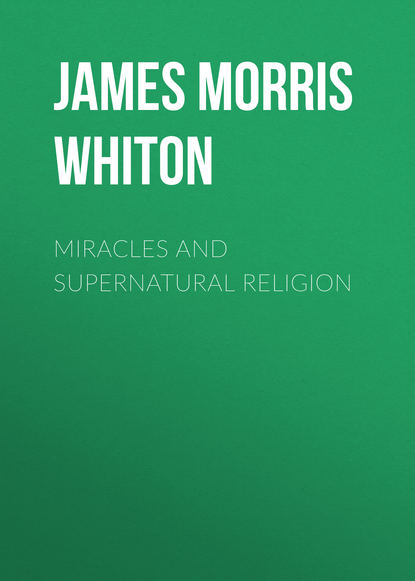 Полная версия
Полная версияMiracles and Supernatural Religion
For an extended exhibition of this line of evidence see "The Assurance of Immortality," and "The Present Pledge of Life to Come" (in two volumes of discourses by the present writer), London, James Clarke & Co. New York, Thomas Whittaker, 1888 and 1889.
45
Could it have been only an apparition? The "census of hallucinations" conducted some ten years since by the Society for Psychical Research evinced the reality of veridical apparitions of deceased persons at or near the time of their death, showing the number of verified cases to be so large as to exclude the supposition of chance hallucination (see Proceedings, August, 1894). Or could it have been a material body suddenly becoming visible in a closed room, as narrated by Luke and John? First-class evidence, if there can be any such for such occurrences, has been exhibited for such phenomena as the passage of solid substances through intervening doors and walls—easy enough, say mathematicians, for a being familiar with the "fourth dimension"—and of the levitation of heavy bodies without physical support. (See Proceedings, January, 1894, and March, 1895.) As to such things scepticism is doubtless in order, but dogmatic contradiction is not. Sub judice lis est.
46
Professor Borden P. Bowne has thus exhibited this great mistake and its grievous consequence:—
"In popular thought, religious and irreligious alike, the natural is supposed to be something that runs itself without any internal guidance or external interference. The supernatural, on the other hand, if there be any such thing, is not supposed to manifest itself through the natural, but by means of portents, prodigies, interpositions, departures from, or infractions of, natural law in general. The realm of law belongs to the natural, and the natural runs itself. Hence, if we are to find anything supernatural, we must look for it in the abnormal, the chaotic, the lawless, or that which defies all reduction to order that may be depended on. This notion underlies the traditional debate between naturalism and supernaturalism.... This unhappy misconception of the relation of the natural to the supernatural has practically led the great body of uncritical thinkers into the grotesque inversion of all reason—the more law and order, the less God."—Zion's Herald, August 22, 1900.
47
"Upon the conception of the supernatural as the personal," says Professor Nash, "apologetics must found the claims of Christianity."—Ethics and Revelation.
48
The words in which Jesus expresses this are much more extraordinary and profoundly significant than any of those mighty works of his, the like of which are recorded of the ancient prophets. Jesus was conscious of God as living in him, and of himself as living in God, in the unity of the one eternal life. Not merely as a man of God, but as a man in God, as no other man has consciously been, does Jesus utter such sayings as, "I am the light of the world," "I and my Father are one." (See "Jesus the Ideal Man," by the present writer. The New World, June, 1897.)
49
Romans viii. 19.
50
Ephesians iv. 13.

